#Pope John XXIII
Text
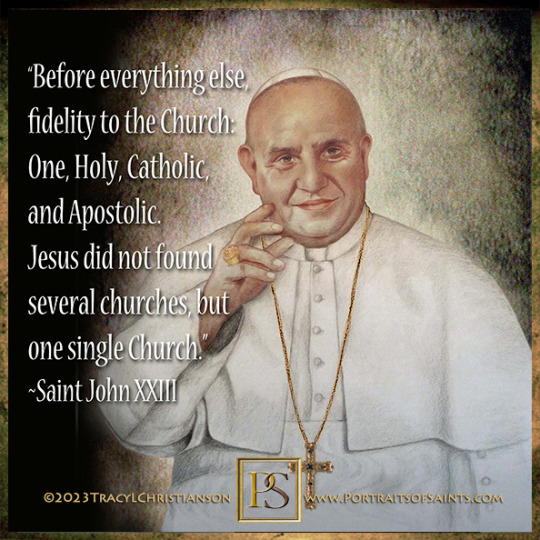
Pope St. John XXIII
1881-1963
Feast Day: October 11
Patronage: Papal Delegates, Patriachary of Venice, Second Vatican CouncilCanonized 2014
Pope John XXIII, affectionally called “The Good Pope”, was born to a large poor sharecropping family. He graduated from college with a doctorate in theology and was ordained a priest in 1904. In 1914 he was drafted into the Italian army and served as a chaplain and stretcher-bearer. Throughout his career, he worked in many church programs including the Society for the Propagation of the Faith, saved thousands of Jews during WWII, was named “Righteous Gentile”, nuncio in France, and Apostolic delegate to Bulgaria, Greece, and Turkey. In 1958 he was unexpectedly elected Pope and in 1962, he called an ecumenical council (Vatican II). He died of stomach cancer in 1963.
Prints, plaques & holy cards available for purchase here: (website)
61 notes
·
View notes
Text
The only choice that works
“Go forth from the land of your kinsfolk and from your father’s house to a land that I will show you. I will make of you a great nation, and I will bless you.”
That’s how God’s call to Abram (who God will later rename Abraham) starts in today’s first reading.
And it is the scariest thing in the world. Because nowhere in it does God say to Abram,
“Here’s the overall plan, these are the progress points, here’s everything you need, and this is your budget (with 50% extra for cost overruns). Have you met the archangel Hannah, My best project manager? She does ‘great nations’ for Me, she’ll be there to help you every step of the way.”
Instead, Abram gets God’s promise that it will be amazing and that God will be with him, plus the first step. And that’s it.
When things like this are scary to us, it says something about what’s going on inside of us. It says that you and I are making the wrong choice, in response to not knowing all the details about what God is doing in our lives.
Because when we don’t know all the details about what God is doing in our lives, we’ve got a choice to make. Even though a lot of us don’t even realize that we have a choice (myself included).
That’s because we are so used to going to worst case scenarios and/or trying to take care of everything ourselves, that it’s become a habit. Something that we start doing, before we even realize that we’re doing it.
We start filling in the details by consulting our fears, by thinking about our frustrations, by focusing on and replaying our failures. And we end up (without ever truly meaning to) with one of the saddest possible outcomes – not doing it and feeling miserable about not doing it.
Which says something else about us – that whoever we think we’re relying on, it’s not God.
Because the anxiety of fear, the anger of frustration, the despair of failure? None of that comes from God.
Instead, realize that you have the power to choose. Then use it intentionally, to set yourself up to succeed. As Pope John XXIII puts it,
“Consult not your fears but your hopes and your dreams. Think not about your frustrations, but about your unfulfilled potential. Concern yourself not with what you tried and failed in, but with what is still possible for you to do.”
Those choices will give you the grace to take that first step.
Those choices reveal that what you’re really doing is relying on God.
And in the end, that’s the only choice that works.
Today’s Readings
#Fear#Plan#God#Jesus#Catholic#Christian#Church#Relying on God#Failure#Frustrated#Choice#Pope John XXIII#Moments Before Mass
23 notes
·
View notes
Text
On 5 May 1961, the Queen and Prince Philip paid a visit to the Vatican City and met Pope John XXIII.

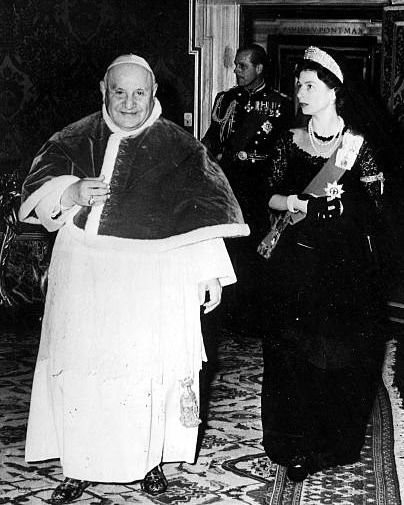
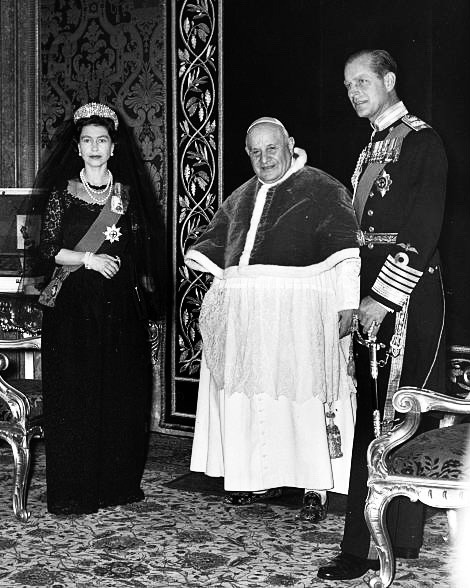

27 notes
·
View notes
Text
About the popes: Leo XIII, Pius X, Benedict XV, Pius XI, Pius XII, John XXIII, Paul VI, John Paul I, John Paul II
this may or may not inspire a pope tournament one of these days
#catholic#catholicism#popes#vatican#pope#pope john paul ii#pope john paul i#pope paul vi#pope john xxiii#pope pius x ii#pope pius xi#pope pius x#pope benedict xv#pope leo xiii
16 notes
·
View notes
Text
SAINT OF THE DAY (October 11)

Born Angelo Giuseppe Roncalli on 25 November 1881 at Sotto il Monte, Italy, Pope John XXIII was elected Pope on 28 October 1958.
He died on 3 June 1963 in Rome.
Angelo was the fourth child of 14, born to pious parents. His religious education was entrusted to his godfather, who instilled in him a deep love and admiration of the mystery of God.
He entered the minor seminary in 1892 at the age of 11, became a Secular Franciscan in 1896, and entered the Pontifical Roman Seminary in 1901.
On being ordained in 1904, he was appointed secretary to the bishop of Bergamo and taught in the seminary.
His great friends among the saints during this formative period were St. Charles Borromeo and St. Francis de Sales, two outstanding intellectuals and also formidable pastors.
He served as a military chaplain during the First World War, served as spiritual director of a seminary, and served as the Italian president of the Society for the Propagation of the Faith in 1921.
In 1925, Pius XI made him a bishop and sent him to Bulgaria as the Apostolic Visitator.
For his Episcopal motto, he chose Oboedientia et Pax.
In 1935, he was assigned to Turkey and Greece where he ministered to the Catholic population and engaged in dialogue with Orthodox Christianity and with Islam.
During the Second World War, he used his diplomatic means to save as many Jews as he could by obtaining safe passage for them.
He was created cardinal and Patriarch of Venice in 1953. He was a much loved pastor, dedicating himself completely to the well being of his flock.
Elected Pope on the death of Pope Pius XII, he was an example of a ‘pastoral’ Pope, a good shepherd who cared deeply for his sheep.
He manifested this concern in his social enyclicals, especially Pacem in Terris, “On peace in the World.”
His greatest act as Pope, however, was undoubtedly the inspiration to convoke the Second Vatican Council, which he opened on 11 October 1962.
Pope John’s spirit of humble simplicity, profound goodness, and deep life of prayer radiated in all that he did. He inspired people to affectionately call him “Good Pope John.”
He was beatified by Pope John Paul II on 3 September 2000.
He was canonized by Pope Francis on 27 April 2014, alongside the man who beatified him, Pope St. John Paul II.
3 notes
·
View notes
Text
Rest in power Sinead O'connor
#sinead o'connor#rest in power#anti religion#pope john xxiii#pope john paul ii#pope francis#catholic stuff#catholic school#catholic saints#catholiscism#catholism#catholicsm#catholic#catholocism#dogma#crackpot religions#religion is toxic#religion is a scam#religious#tw abuse#child abuse#emotional abuse#abuse#child trafficking#child abduction#child labor#children#childhood#child#church
4 notes
·
View notes
Link
Some highlights from this 2014 article (favorite one bolded):
1. Visiting a hospital, he asked a boy what he wanted to be when he grew up. The boy said either a policeman or a pope. “I would go in for the police if I were you,” the pope said. “Anyone can become a pope, look at me!”
3. In reply to a reporter who asked, “How many people work in the Vatican?”, he reportedly said: “About half of them.”
4. When a cardinal complained that a rise in Vatican salaries meant a particular usher earned as much as the cardinal, the pope remarked: “That usher has 10 children; I hope the cardinal doesn't.”
5. When he went to visit a friend at the nearby Hospital of the Holy Spirit in the evening, the nun answering the door said: “Holy Father, I'm the mother superior of the Holy Spirit.” He replied: “Lucky you! What a job! I'm just the ‘servant of the servants of God.’”
6. Not long after he was elected pope, Blessed John was walking in the streets of Rome. A woman passed him and said to her friend, “My God, he’s so fat!” Overhearing what she said, he turned around and replied, “Madame, I trust you understand that the papal conclave is not exactly a beauty contest.”
10. A Vatican official told the pope it would be “absolutely impossible” to open the Second Vatican Council by 1963. “Fine, we'll open it in 1962,” he answered. And he did.
33 notes
·
View notes
Text
“The whole world had recognized Pope John as a pastor and father; a pastor because he was a father. What had made him one? How had he been able to reach the heart of people so different from each other and even many non-Christians? To answer this question we may refer to his episcopal motto, Oboedientia et Pax: obedience and peace. “These words”, Mons. Roncalli noted on the eve of his episcopal ordination, ‘in a certain way sum up my story and my life’. (Journal of a Soul, retreat in preparation for episcopal ordination, 13-17 March 1925). Obedience and peace.
I would like to start with peace, because this is the most obvious aspect, the one that people perceived in Pope John: Angelo Roncalli was a man who could communicate peace; natural, serene and cordial peace; a peace which, with his election to the Pontificate, was manifested to the whole world and was described as ‘goodness’.
…
Indeed Pope John conveyed peace because his mind was profoundly at peace: he had let the Holy Spirit create peace within him. And this mind filled with peace was the result of long and challenging work on himself, abundant traces of which have been left in the Journal of a Soul. In it we can see Roncalli — the seminarian, the priest, the bishop — coming to grips with the gradual process of purification of the heart. We see him, day by day, taking pains to recognize and mortify the desires that stemmed from his own selfishness and to discern the inspirations of the Lord, letting himself be guided by wise spiritual directors and be inspired by teachers such as St Francis de Sales and St Charles Borromeo. In reading these writings we truly see a soul being formed under the action of the Holy Spirit who works in his Church, in souls: it was the Spirit himself who, with these good inclinations, brought peace to Roncalli’s soul.
Here we come to the second and crucial word: ‘obedience’. Although peacefulness was his external feature, Roncalli’s inner disposition consisted of obedience. Obedience, in fact, was his means for attaining peace. First of all it had a very simple and practical meaning: carrying out in the Church the service that his superiors asked of him, seeking nothing for himself, not shrinking from anything requested of him, even when it meant leaving his homeland to face worlds unknown to him and staying long years in places where Catholics were few and far between. It was his willingness to be led like a child that forged his career as a priest, with which you are well acquainted; secretary to Bishop Radini Tedeschi and at the same time teacher and spiritual director at the diocesan seminary; Papal Representative in Bulgaria, in Turkey and Greece, and in France; Pastor of the Venetian Church, and, finally, Bishop of Rome. Yet through this obedience, Roncalli — as a priest and as a bishop — also lived a deeper faithfulness, which we could describe, as he might have said, as abandonment to Divine Providence. He constantly recognized in faith that through living in this way, seemingly led by others and not by his own preferences or on the basis of his own spiritual sensibility, God was designing a project of his own. He was a man of governance, he was a leader. But he was a leader led by the Holy Spirit, out of obedience.
The future Pope John experienced even more profoundly, through this daily abandonment to God’s will, a purification that enabled him to be completely detached from himself and to adhere to Christ. It was in this manner that he let the holiness shine out which the Church was later to recognize officially. ‘Whoever loses his life for my sake, he will save it’, Jesus says (Lk 9:24). This is the true source of Pope John’s goodness, of the peace he disseminated throughout the world. It is here that the root of his holiness is found: in his evangelical obedience.
This is a lesson for each one of us, but also for the Church of our time: if we let ourselves be led by the Holy Spirit, if we are able to mortify our selfishness to make room for the Lord’s love and for his will, we will find peace, we will be builders of peace and will spread peace around us. Fifty years after his death the wise and fatherly guidance of Pope John, his love for the Church’s Tradition and his awareness of the constant need for renewal, his prophetic intuition of the convocation of the Second Vatican Council and his offering of his life for its success stand as milestones in the history of the Church in the 20th century; and as a bright beacon for the journey that lies ahead.”
- Pope Francis, PILGRIMAGE FROM THE DIOCESE OF BERGAMO ON THE 50th ANNIVERSARY OF THE DEATH OF BLESSED POPE JOHN XXIII, 3 June 2013
1 note
·
View note
Text
“Good Pope John!”
Pope John XXIII
Saint John XXIII was born Angelo Giuseppe Roncalli, in 1881. Born to an Italian peasant family, the fourth child in a family of fourteen. He felt called to the priesthood, and entered a seminary. Encouraged by his spiritual director, he joined and was professed into the Secular Franciscan Order. He was ordained a priest in 1904.
In 1905, he served as secretary to the bishop of…

View On WordPress
0 notes
Photo
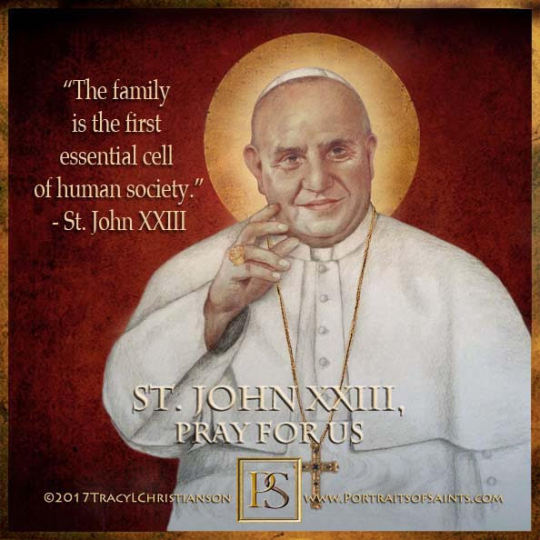
Happy Feast Day
Pope St. John XXIII
1881-1963
Feast Day: October 11
Patronage: Papal Delegates, Patriachary of Venice, Second Vatican CouncilCanonized 2014
Pope John XXIII, affectionally called “The Good Pope”, was born to a large poor sharecropping family. He graduated from college with a doctorate in theology and was ordained a priest in 1904. In 1914 he was drafted into the Italian army and served as a chaplain and stretcher-bearer. Throughout his career, he worked in many church programs including the Society for the Propagation of the Faith, saved thousands of Jews during WWII, was named “Righteous Gentile”, nuncio in France, and Apostolic delegate to Bulgaria, Greece, and Turkey. In 1958 he was unexpectedly elected Pope and in 1962, he called an ecumenical council (Vatican II). He died of stomach cancer in 1963.
{website}
45 notes
·
View notes
Text
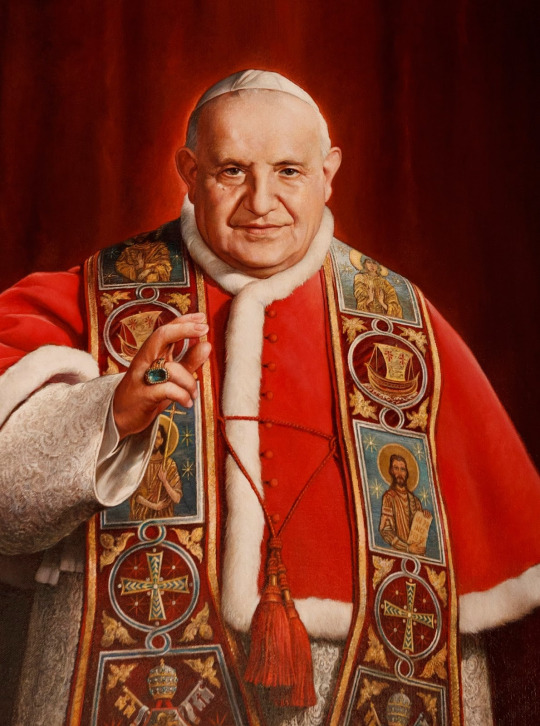
THE DESCRIPTION OF POPE SAINT JOHN XXIII
Feast Day: October 11
"This is the rosary of Mary, considered in its various elements, which are linked together in vocal prayer and woven into it, as in a delicate and rich embroidery, full of spiritual warmth and beauty." -excerpt from The Holy Rosary. P 360, Journal of a Soul
When on October 20, 1958, the cardinals, assembled in conclave, elected Angelo Roncalli as pope many regarded him, because of his age and ambiguous reputation, as a transitional pope, little realizing that the pontificate of this man of 76 years would mark a turning point in history and initiate a new age for the Church. He took the name of John in honor of the precursor and the beloved disciple—but also because it was the name of a long line of popes whose pontificates had been short.
Angelo Giuseppe Roncalli, the third of thirteen children, was born on November 25, 1881 at Sotto il Monte (Bergamo) of a family of sharecroppers. He attended elementary school in the town, was tutored by a priest of Carvico, and at the age of twelve entered the seminary at Bergamo. A scholarship from the Cerasoli Foundation (1901) enabled him to go on to the Apollinaris in Rome where he studied under (among others) Umberto Benigni, the Church historian. He interrupted his studies for service in the Italian Army but returned to the seminary, completed his work for a doctorate in theology, and was ordained in 1904. Continuing his studies in canon law he was appointed secretary to the new bishop of Bergamo, Giacomo Radini-Tedeschi. Angelo served this social-minded prelate for nine years, acquiring first-hand experience and a broad understanding of the problems of the working class. He also taught apologetics, church history, and patrology.
With the entry of Italy into World War I in 1915, he was recalled to military service as a chaplain. On leaving the service in 1918 he was appointed spiritual director of the seminary, but found time to open a hostel for students in Bergamo. It was at this time also that he began the research for a multi-volume work on the episcopal visitation of Bergamo by St. Charles Borromeo, the last volume of which was published after his elevation as pope.
In 1921, he was called to Rome to reorganize the Society for the Propagation of the Faith. Nominated titular archbishop of Areopolis and apostolic visitator to Bulgaria (1925), he immediately concerned himself with the problems of the Eastern Churches. Transferred in 1934 to Turkey and Greece as apostolic delegate, he set up an office in Istanbul for locating prisoners of war. In 1944 he was appointed nuncio to Paris to assist in the Church's post-war efforts in France, and became the first permanent observer of the Holy See at UNESCO, addressing its sixth and seventh general assemblies in 1951 and 1952. In 1953 he became cardinal-patriarch of Venice, and expected to spend his last years there in pastoral work. He was correcting proofs of the synodal Acts of his first diocesan Synod (1958) when he was called to Rome to participate in the conclave that elected him pope.
In his first public address Pope John expressed his concern for reunion with separated Christians and for world peace. In his coronation address he asserted 'vigorously and sincerely' that it was his intention to be a pastoral pope since 'all other human gifts and accomplishments—learning, practical experience, diplomatic finesse—can broaden and enrich pastoral work but they cannot replace it.'
One of his first acts was to annul the regulation of Sixtus IV limiting the membership of the College of Cardinals to 70; within the next four years he enlarged it to 87 with the largest international representation in history.
Less than three months after his election he announced that he would hold a diocesan synod for Rome, convoke an ecumenical council for the universal Church, and revise the Code of Canon Law. The synod, the first in the history of Rome, was held in 1960; Vatican Council II was convoked in 1962; and the Pontifical Commission for the Revision of the Code was appointed in 1963.
His progressive encyclical, Mater et Magistra, was issued in 1961 to commemorate the anniversary of Leo XIII's Rerum novarum. Pacem in terris, advocating human freedom and dignity as the basis for world order and peace, came out in 1963. He elevated the Pontifical Commission for Cinema, Radio, and Television to curial status, approved a new code of rubrics for the Breviary and Missal, made notable advances in ecumenical relations by creating a new Secretariat for Promoting Christian Unity and by appointing the first representative to the Assembly of the World Council of Churches held in New Delhi (1961). In 1960 he consecrated fourteen bishops for Asia, Africa, and Oceania. The International Balzan Foundation awarded him its Peace Prize in 1962.
Since his death on June 3, 1963, much has been written and spoken about the warmth and holiness of the beloved Pope John. Perhaps the testimony of the world was best expressed by a newspaper drawing of the earth shrouded in mourning with the simple caption, 'A Death in the Family.'
Source: vatican.va
0 notes
Text
O 23
O 23: Quando 2+3 Não É 5, Alguns Vêem um Enigma
Quando 2 + 3 Não É 5,
Alguns Vêem Um Enigma
Números e a Internet. Criados para avaliar e rastrear o mundo, são agora infinitos e vão seguir existindo muito depois de desaparecermos. Como a matéria pode se reduzir à sua representação numérica, toda expressão humana um dia vai residir apenas no reino digital.
Por exemplo, o número 23, que o destino me deu com meu primeiro sopro de ar. Como outros,…

View On WordPress
#23rdians#Anna Chapman#Aziz Ansari#Birthday Paradox#Dakota Fanning#Discordianism#Emily Blunt#Eris#G.F.Handel#Great Pyramid of Giza#ISS#Jim Carey#John Forbes Nash#Johnny Winter#Michael Jordan#Philip K. Dick#Pope John XXIII#Robert Anton Wilson#Russell Crowe#Supernova#Victor Fleming#W.E.B.Dubois#William Burroughs
1 note
·
View note
Text
Super short lesson on what an encyclical is: a special letter from the pope that is meant to be addressed to a wide range of people, on a big social issue of the day. The modern concept of papal encyclicals was kicked off by Leo XIII's Rerum novarum, on work and human labor, in which he decried poor working conditions and defended unions and good wages. Papal encyclicals are foundational to what is known as Catholic social teaching or Catholic social thought, the social justice tradition of the Church.
Rerum novarum
Mater et magistra
Pacem in terris
Populorum progressio
Humanae vitae
Evangelium vitae
Fides et ratio
Deus caritas est
Caritas in veritate
Laudato si'
Fratelli tutti
#catholic popes#papal encyclicals#rerum novarum#mater et magistra#pacem in terris#populorum progressio#humanae vitae#evangelium vitae#fides et ratio#deus caritas est#caritas in veritate#laudato si#fratelli tutti#pope francis#pope benedict xvi#pope john paul ii#pope john xxiii#pope paul vi#pope leo xiii#catholic#catholicism#theology
10 notes
·
View notes
Text
"In 1992, O’Connor tore up a photograph of Pope John Paul II on US television programme Saturday Night Live in an act of protest against sex abuse in the Catholic Church."
#sinead o'connor#rest in power#pope john xxiii#pope john paul ii#pope francis#pope heyward#abuse#substance abuse treatment#emotional abuse#tw abuse#child abuse#children#child trafficking#child abduction#childhood#child labor#child#catholic stuff#catholic school#capitalist bullshit#catholic saints#catholic#catholiscism#catholics and catholicism#catholicism#catholic imagery#catholic iconography#religion is toxic#religion#religion is bullshit
0 notes
Text
Kind of heart-warming that Pope John XXIII added a little note to his last will and testament that said, “It is with a joyful heart that I renew wholly and fervently the profession of my Catholic, Apostolic, and Roman faith.”
21 notes
·
View notes
